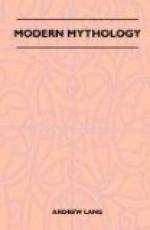The learned Professor’s remarks on being ’much more my ally than my opponent’ were published before my Myth, Ritual, and Religion, in which (i. 24, 25) I cited his agreement with me in the opinion that ’the philological method’ (Mr. Max Muller’s) is ’inadequate and misleading, when it is a question of discovering the origin of a myth.’ I also quoted his unhesitating preference of ours to Mr. Max Muller’s method (i. 43, 44). I did not cite a tithe of what he actually did say to our credit. But I omitted to quote what it was inexcusable not to add, that Professor Tiele thinks us ‘too exclusive,’ that he himself had already, before us, combated Mr. Max Muller’s method in Dutch periodicals, that he blamed our ‘songs of triumph’ and our levities, that he thought we might have ignorant camp-followers, that I glided over important questions (bees, blood-drops, stars, Melian nymphs, the phallus of Ouranos, &c.), and showed scientific inexactitude in declining chercher raison ou il n’y en a pas.
None the less, in Professor Tiele’s opinion, our method is new (or is not new), illuminating, successful, and alone successful, for the ends to which we apply it, and, finally, we have shown Mr. Max Muller’s method to be a house builded on the sand. That is the gist of what Professor Tiele said.
Mr. Max Muller, like myself, quotes part and omits part. He quotes twice Professor Tiele’s observations on my deplorable habit of gliding over important questions. He twice says that we have ‘actually’ claimed the Professor as ‘an ally of the victorious army,’ ’the ethnological students of custom and myth,’ and once adds, ’but he strongly declined that honour.’ He twice quotes the famous braves gens passage, excepting only M. Gaidoz, as a scholar, from a censure explicitly directed at our possible camp-followers as distinguished from ourselves.
But if Mr. Max Muller quotes Professor Tiele’s remarks proving that, in his opinion, the ‘army’ is really victorious; if he cites the acquiescence in my opinion that his mythological house is ’builded on the sands,’ or Professor Tiele’s preference for our method over his own, or Professor Tiele’s volunteered remark that he is ’much more our ally than our adversary,’ I have not detected the passages in Contributions to the Science of Mythology.
The reader may decide as to the relative importance of what I left out, and of what Mr. Max Muller omitted. He says, ’Professor Tiele and I differ on several points, but we perfectly understand each other, and when we have made a mistake we readily confess and correct it’ (i. 37).
The two scholars, I thought, differed greatly. Mr. Max Muller’s war-cry, slogan, mot d’ordre, is to Professor Tiele ‘a false hypothesis.’ Our method, which Mr. Max Muller combats so bravely, is all that Professor Tiele has said of it. But, if all this is not conspicuously apparent in our adversary’s book, it does not become me to throw the first stone. We are all, in fact, inclined unconsciously to overlook what makes against our argument. I have done it; and, to the best of my belief, Mr. Max Muller has not avoided the same error.




